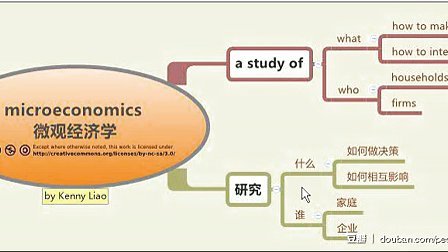- 在线播放
- 分集下载
- 23.1 Microeconomics
- 23.2 macroeconomics
- 23.3 Macroeconomics everywhere
- 23.4 the economy's income and expenditure
- 23.5 what is GDP
- 23.6 GDP's components
- 23.7 5 other income measurements
- 23.8 real and nominal GDP
- 23.9 GDP a good measure of economic well-being
- 24.1 consumer price index
- 24.2 problems with CPI
- 24.3 the GDP deflator & CPI
- 24.4dollar figures from different time
- 24.5 indexation
- 24.6 interest rate and inflation
- 25.1 production and growth
- 25.2 economic growth around the world
- 25.3 productivity roles and determinants
- 25.4 economic growth and public policy
- 26.1 savings, investments and financial system
- 26.2 financial markets
- 26.3 financial intermediaries
- 26.4 national income account
- 26.5 saving and investment
- 26.6 model of loanable funds
- 26.7 policy and demand supply model
- 26.8 debtGDP ratio
- 27.basic tools of finance
- 28.1 identify unemployment and job search
- 28.2 job search
- 28.3 minimum wage law
- 28.4 Union and collective bargaining
- 28.5 theory of efficient wage
- 29.1 meaning of money
- 29.2 federal reserve system
- 29.3banks and money supply
- 29.4 fed's tool of monetary control
- 30. money growth and inflation intro
- 30.1 level of price and value of money
- 30.2 money demand,supply and equilibrium
- 30.3 the effect of money injection
- 30.4 classical dichotomy and monetary neutrality
- 30.5 velocity and quantity equation
- 30.6 inflation tax
- 30.7 the fisher effect
- 30.8 costs of inflation
- 31.1 flow of goods
- 31.2 flow of financial resources
- 31.3 equality of net export and net capital outflow
- 31.4 saving,investment, relate to international flow
- 31.5 price of international transaction nominal and real ex
- 31.6 real exchange rate
- 31.7 exchange rate theory purchasing power parity
- 32.0 two markets in an open economy
- 32.1 demand and supply of loanable funds market
- 32.2 demand and supply of foreign exchange market
- 32.3 equilibrim in open economy
- 32.4 government budget deficit
- 32.5 trade policy affect two market
- 32.6 political instability and capital flight
- 33.1 three key facts of economic fluctuations
- 33.2 short term economic fluctuations
- 33.3 model of aggregate supply and demand
- 33.4 aggregate demand curve slope down
- 33.5 aggregate demand curve shift
- 33.6 aggregate supply curve in long run
- 33.7aggregate supply curve in short run
- 33.8 cause of economic fluctuation1
- 33.9 two causes of economic fluctuations 2
- 34.1 how monetary policy affect aggregate demand
- 34.2 how fiscal policy influence aggregate demand
- 34.3 policy to stablize economy
宏观经济学--曼昆经济学原理(英文版6th ed)的相关介绍
第一版:笔记+语音 (始于2013.8.1)
教程列表:
23.1 Microeconomics
23.2 macroeconomics
23.3 Macroeconomics everywhere
23.4 the economy's income and expenditure
23.5 what is GDP
23.6 GDP's components
23.7 5 other income measurements
23.8 real and nominal GDP
23.9 GDP a good measure of economic well-being
24.1 consumer price index
24.2 problems with CPI
24.3 the GDP deflator & CPI
24.4dollar figures from different time
24.5 indexation
24.6 interest rate and inflation
25.1 production and growth
25.2 economic growth around the world
25.3 productivity roles and determinants
25.4 economic growth and public policy
26.1 savings, investments and financial system
26.2 financial markets
26.3 financial intermediaries
26.4 national income account
26.5 saving and investment
26.6 model of loanable funds
26.7 policy and demand supply model
26.8 debtGDP ratio
27.basic tools of finance
28.1 identify unemployment and job search
28.2 job search
28.3 minimum wage law
28.4 Union and collective bargaining
28.5 theory of efficient wage
29.1 meaning of money
29.2 federal reserve system
29.3banks and money supply
29.4 fed's tool of monetary control
30. money growth and inflation intro
30.1 level of price and value of money
30.2 money demand,supply and equilibrium
30.3 the effect of money injection
30.4 classical dichotomy and monetary neutrality
30.5 velocity and quantity equation
30.6 inflation tax
30.7 the fisher effect
30.8 costs of inflation
31.1 flow of goods
31.2 flow of financial resources
31.3 equality of net export and net capital outflow
31.4 saving,investment, relate to international flow
31.5 price of international transaction nominal and real ex
31.6 real exchange rate
31.7 exchange rate theory purchasing power parity
32.0 two markets in an open economy
32.1 demand and supply of loanable funds market
32.2 demand and supply of foreign exchange market
32.3 equilibrim in open economy
32.4 government budget deficit
32.5 trade policy affect two market
32.6 political instability and capital flight
33.1 three key facts of economic fluctuations
33.2 short term economic fluctuations
33.3 model of aggregate supply and demand
33.4 aggregate demand curve slope down
33.5 aggregate demand curve shift
33.6 aggregate supply curve in long run
33.7aggregate supply curve in short run
33.8 cause of economic fluctuation1
33.9 two causes of economic fluctuations 2
34.1 how monetary policy affect aggregate demand
34.2 how fiscal policy influence aggregate demand
34.3 policy to stablize economy





